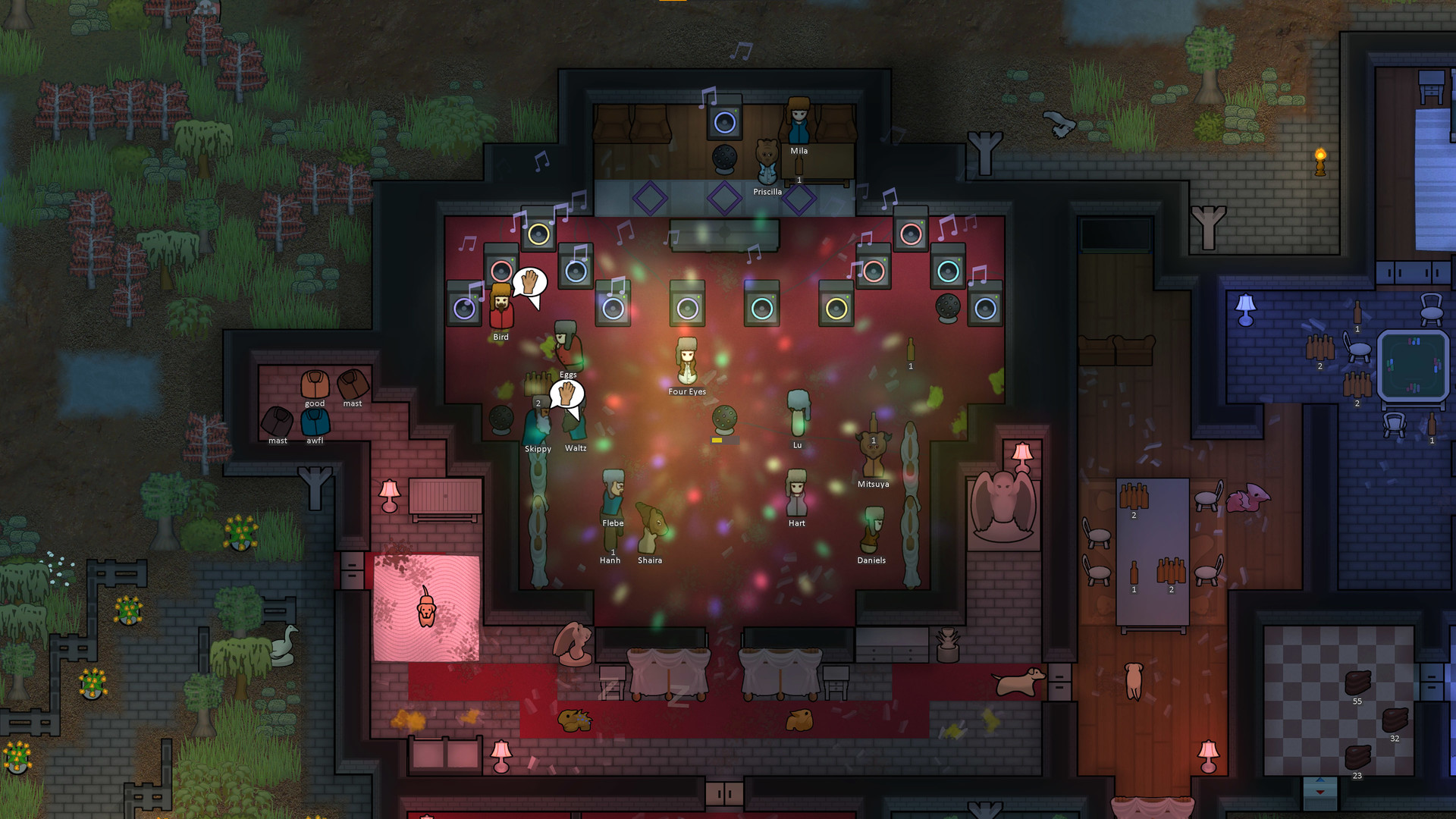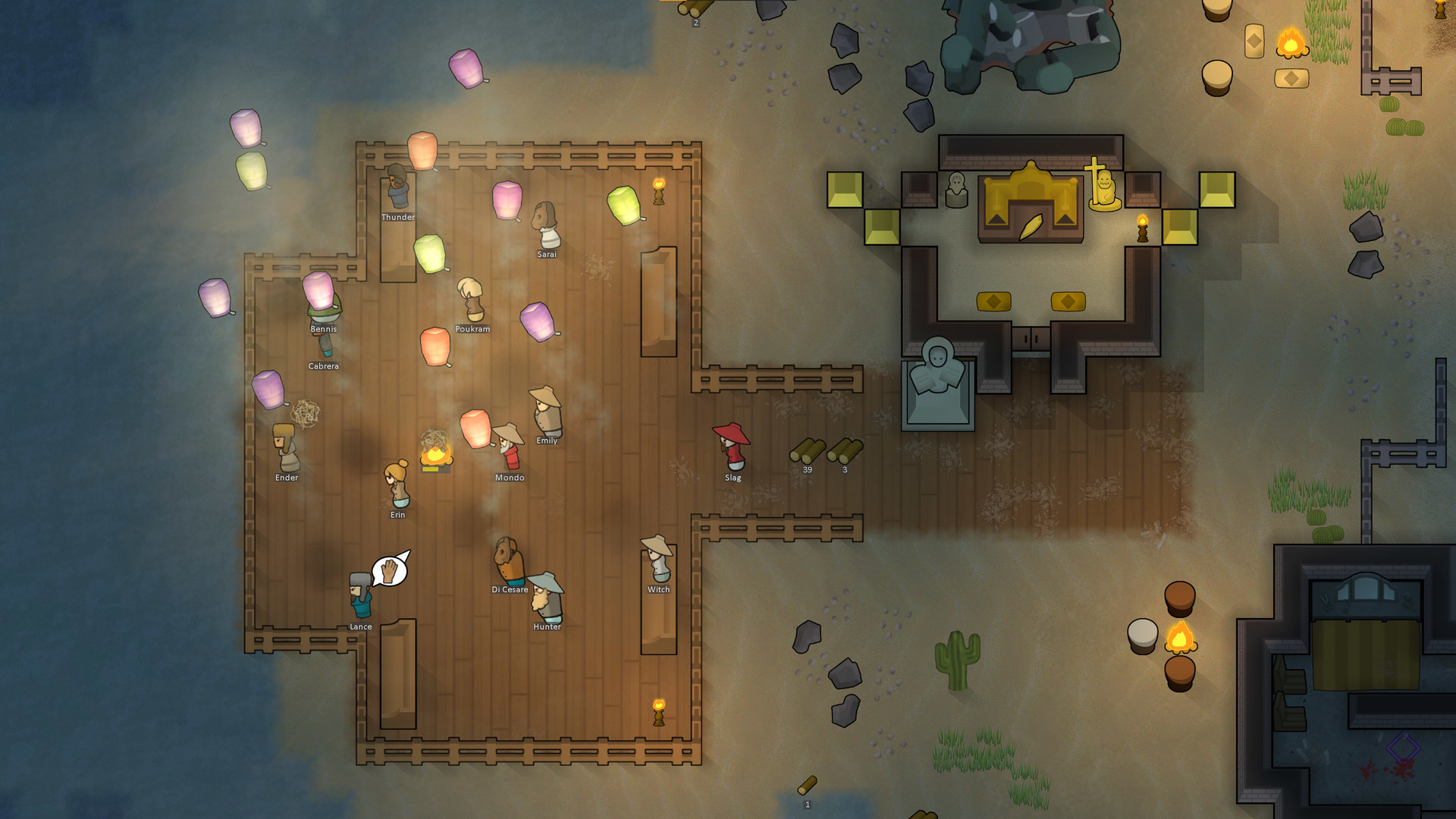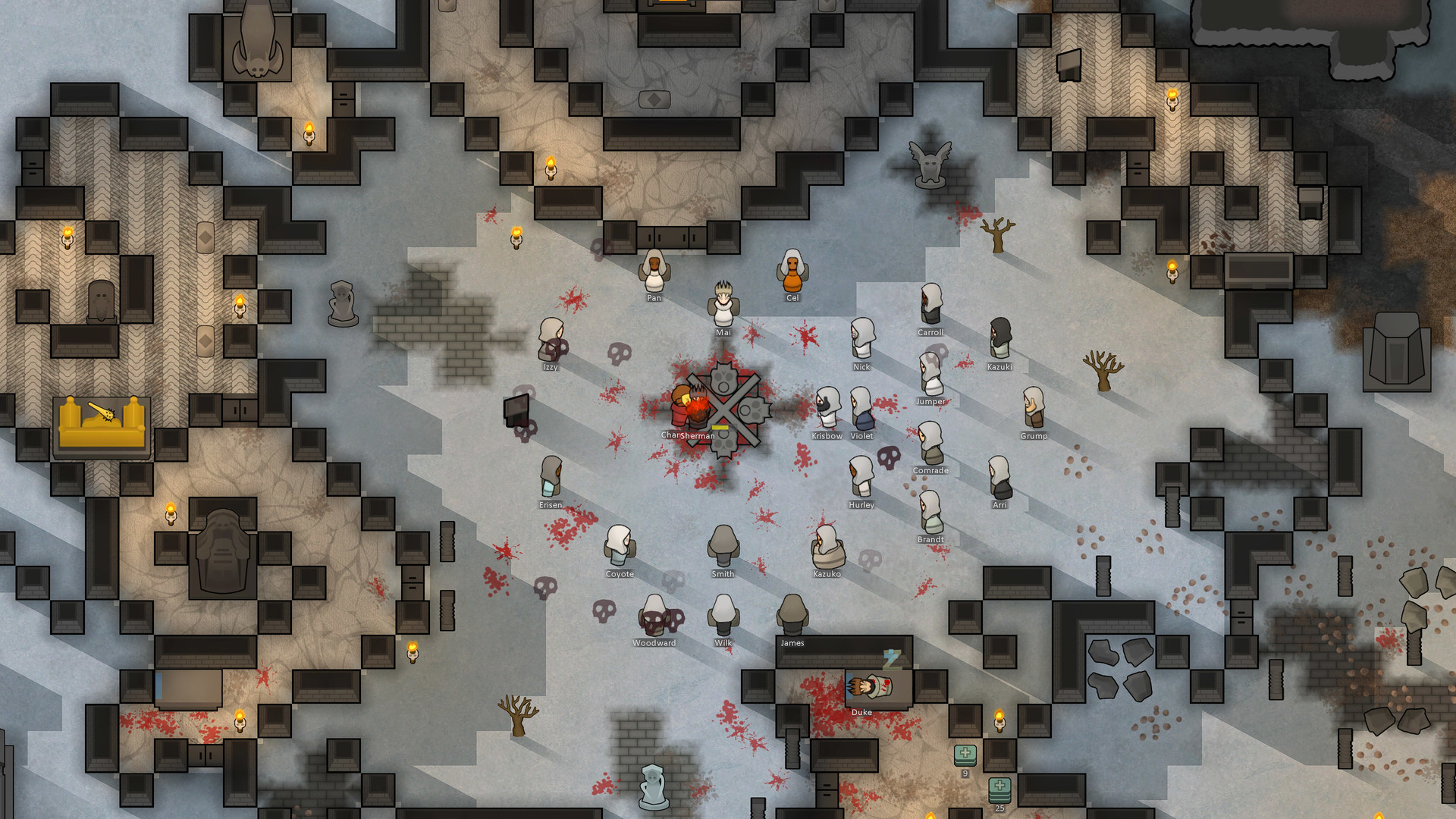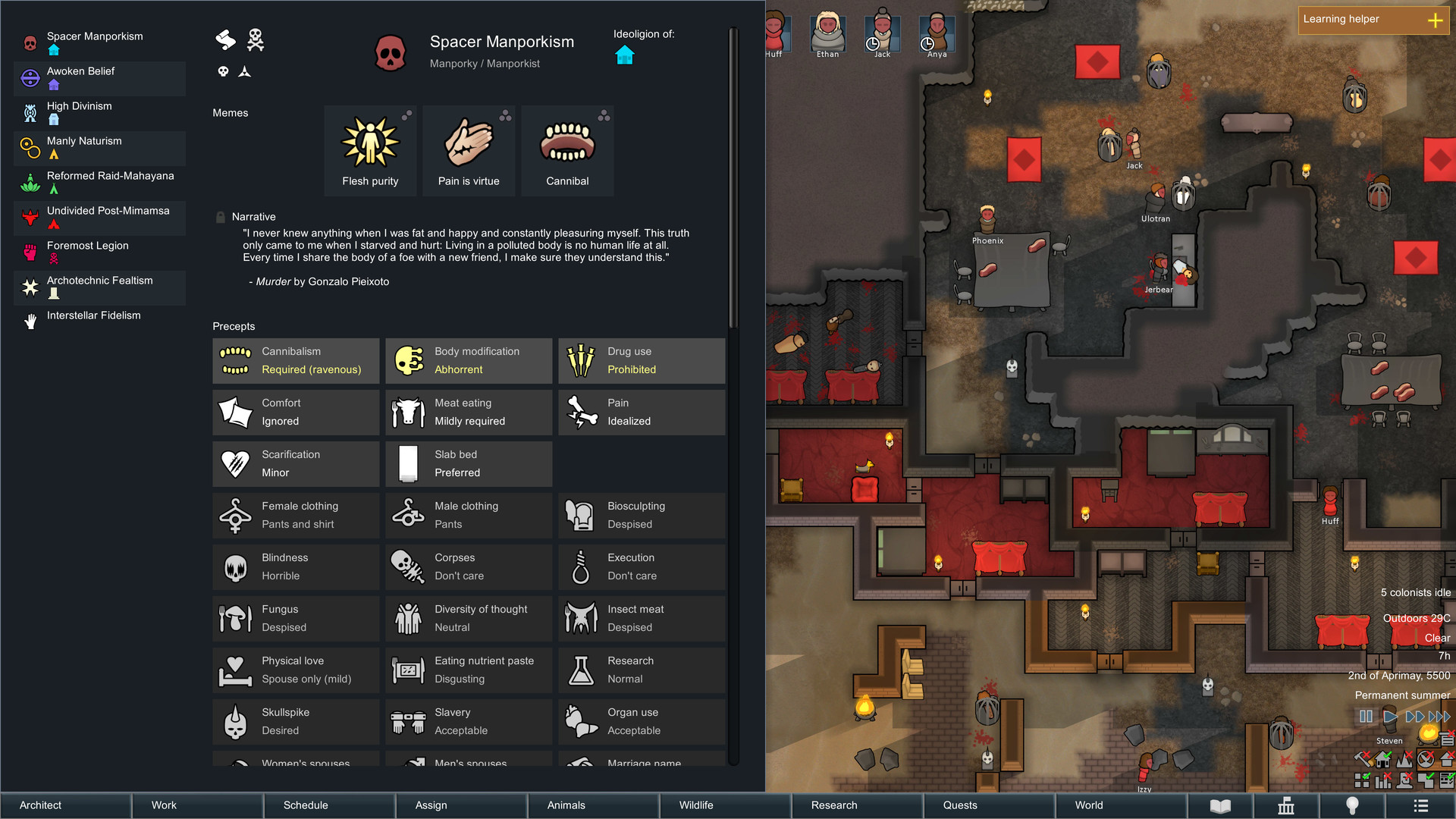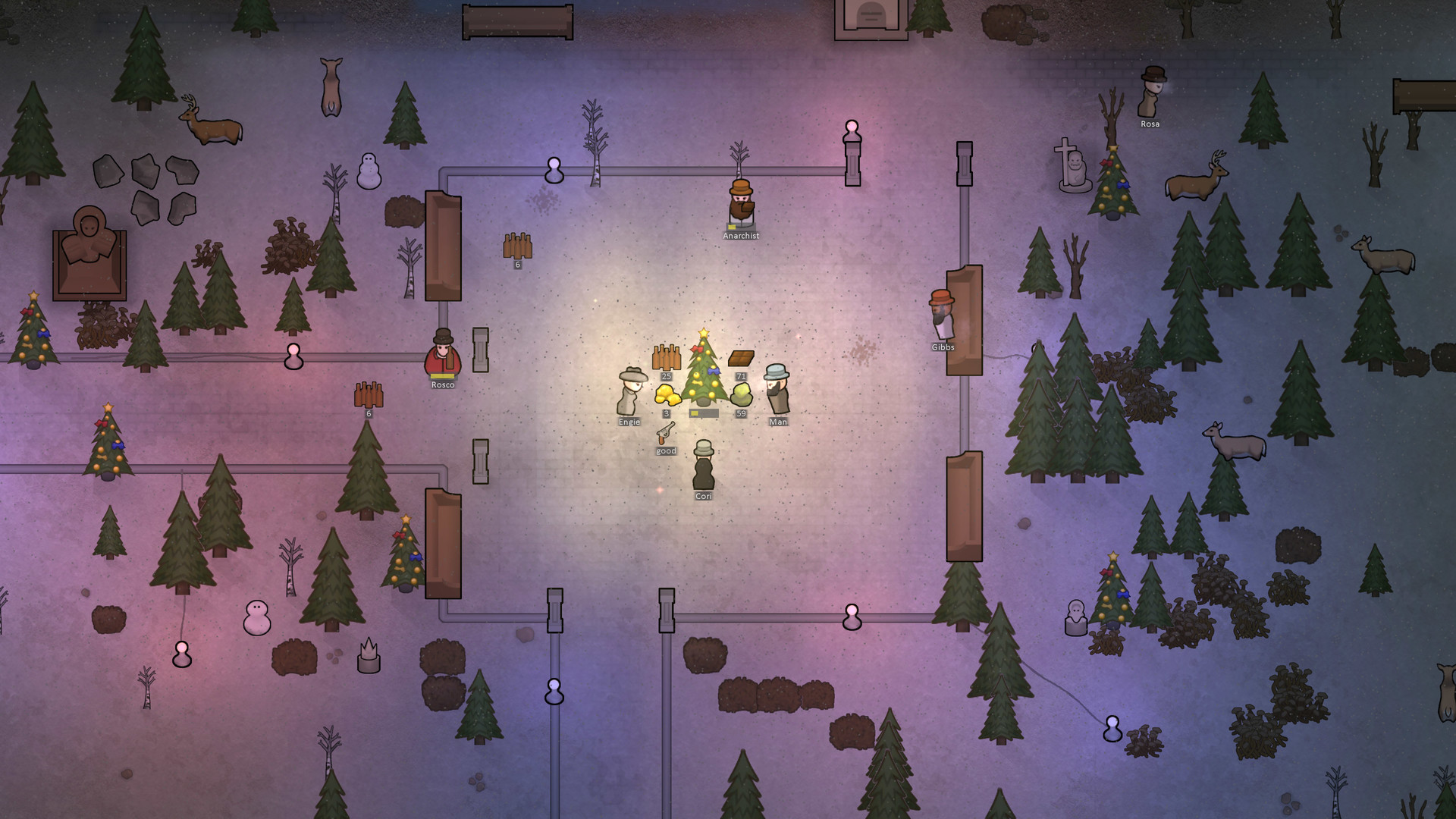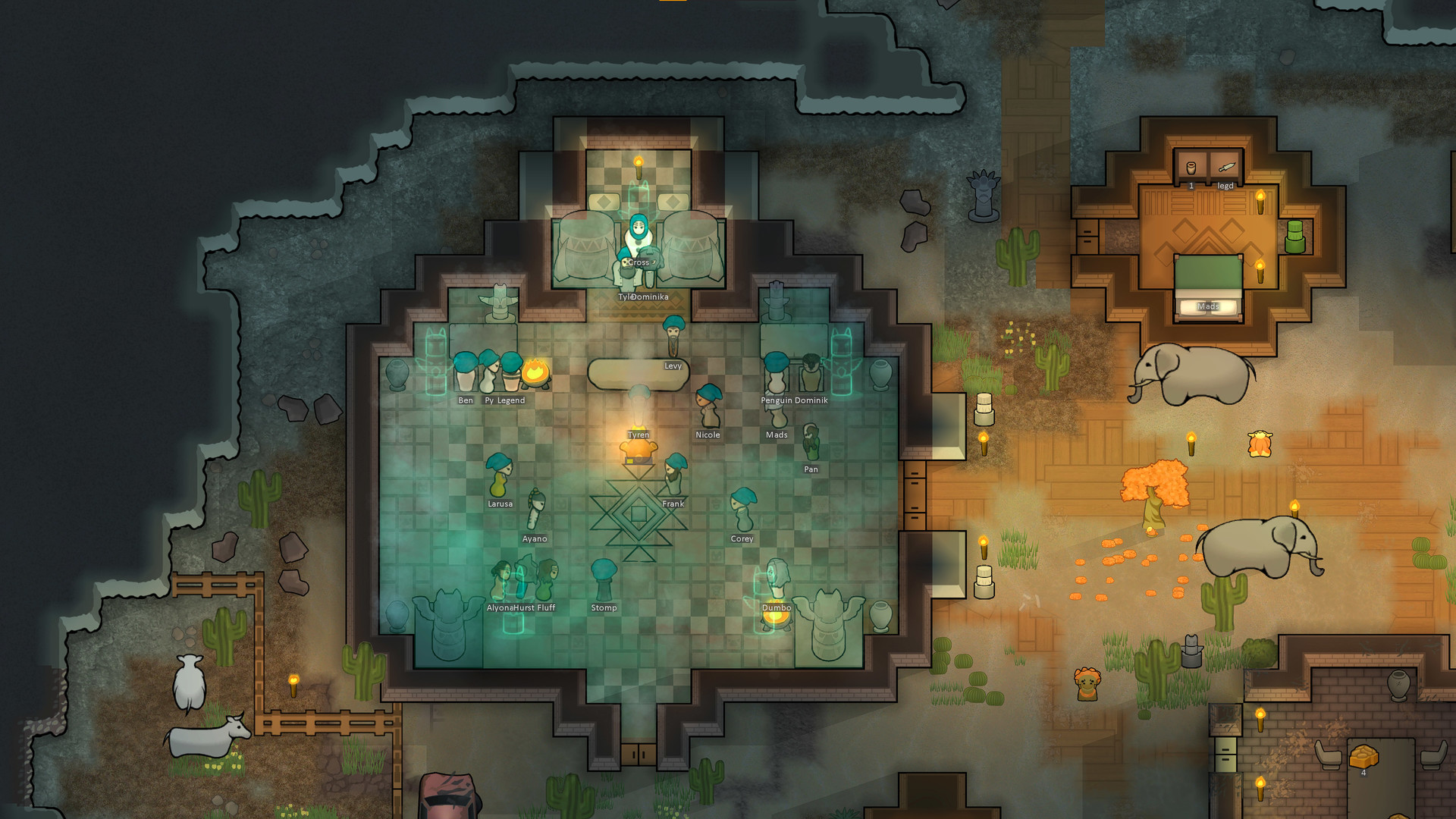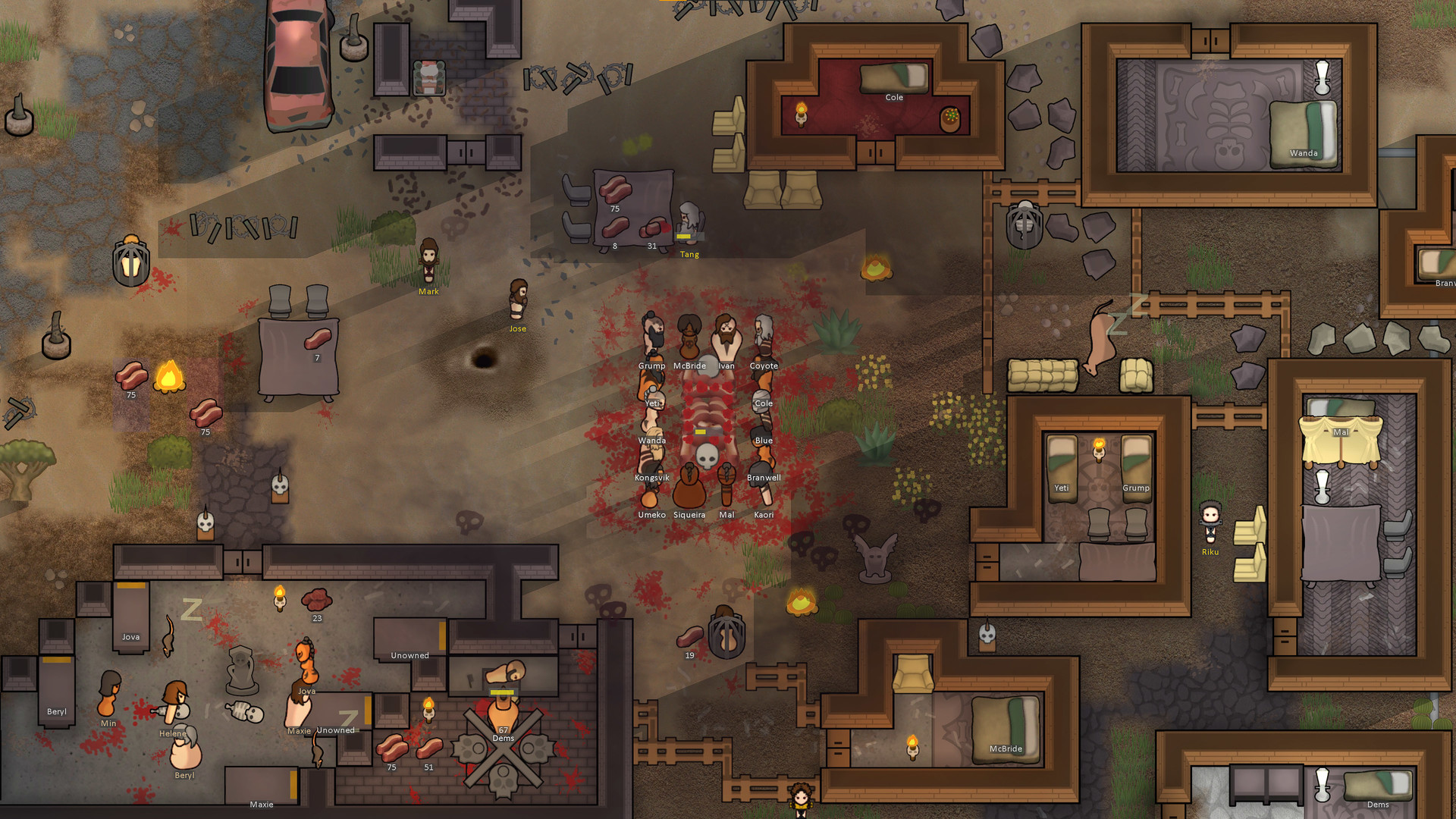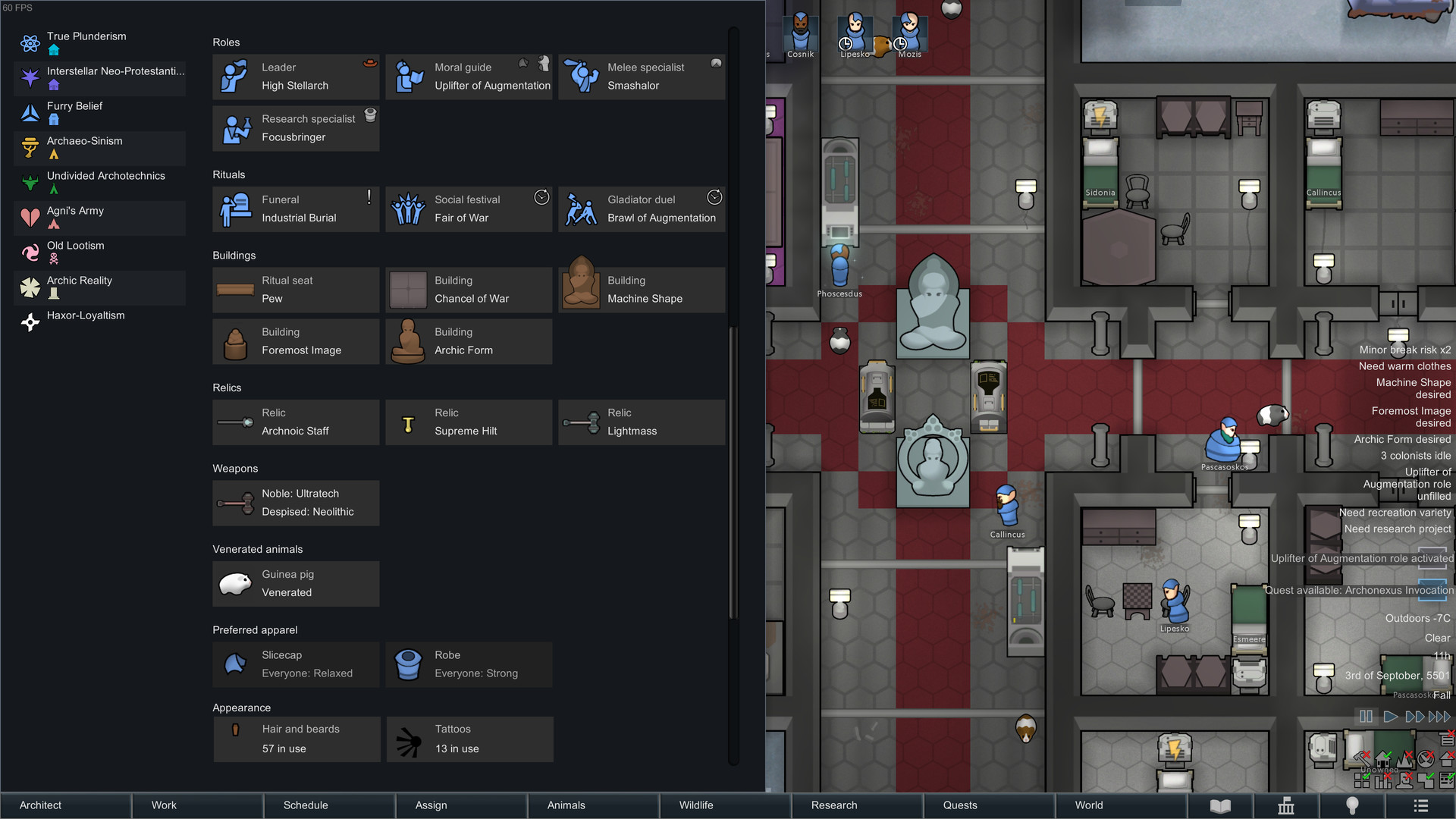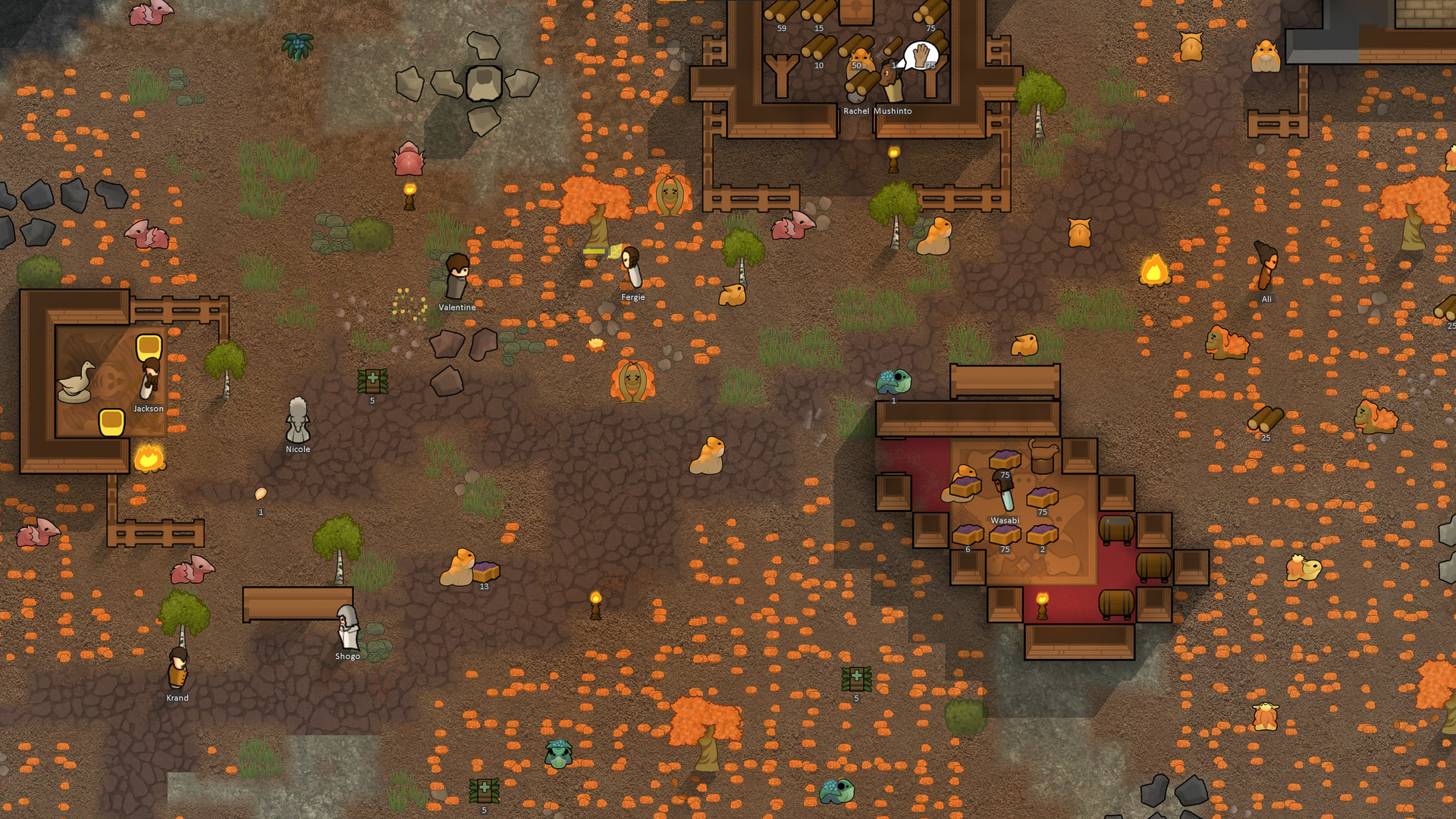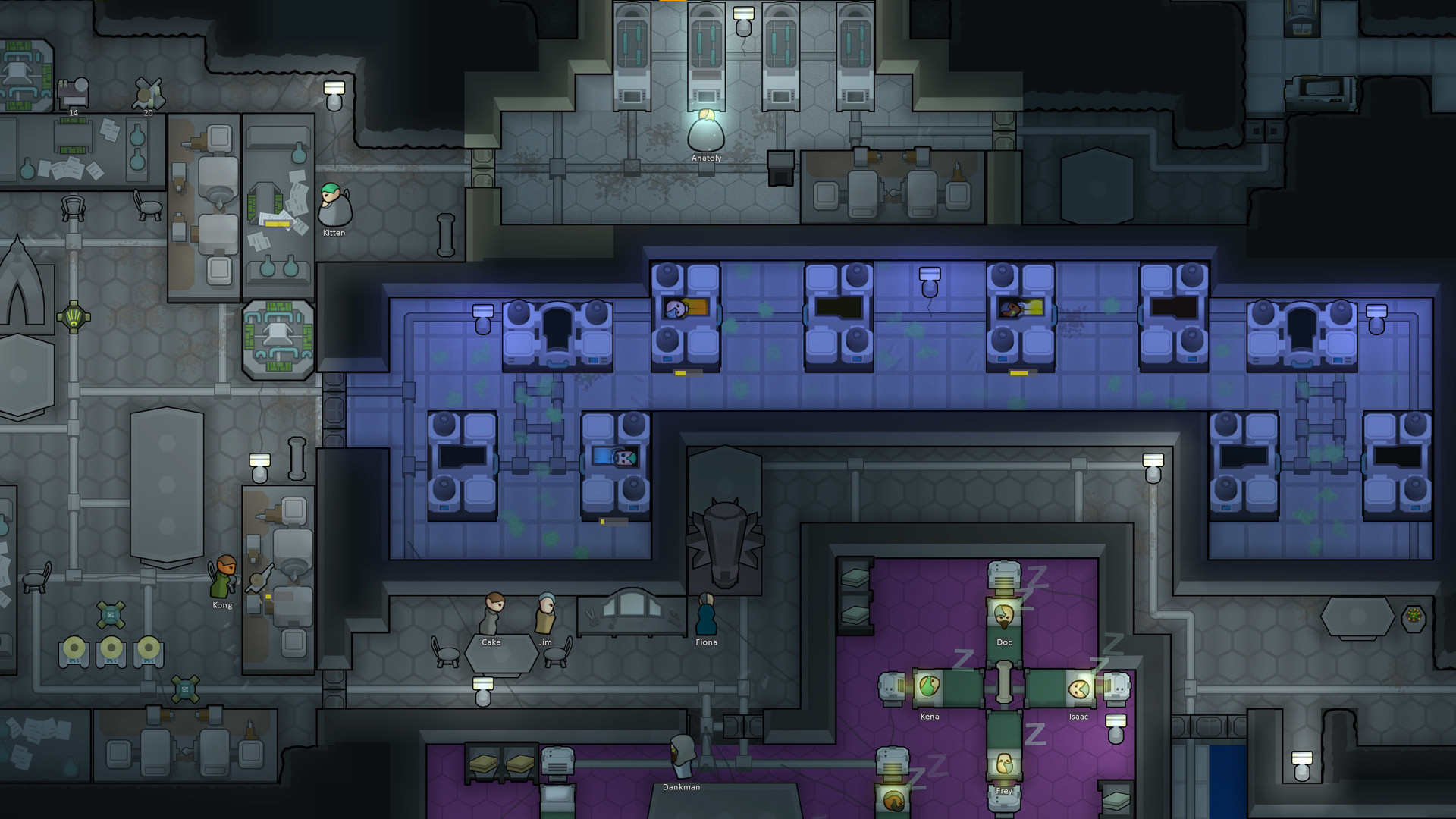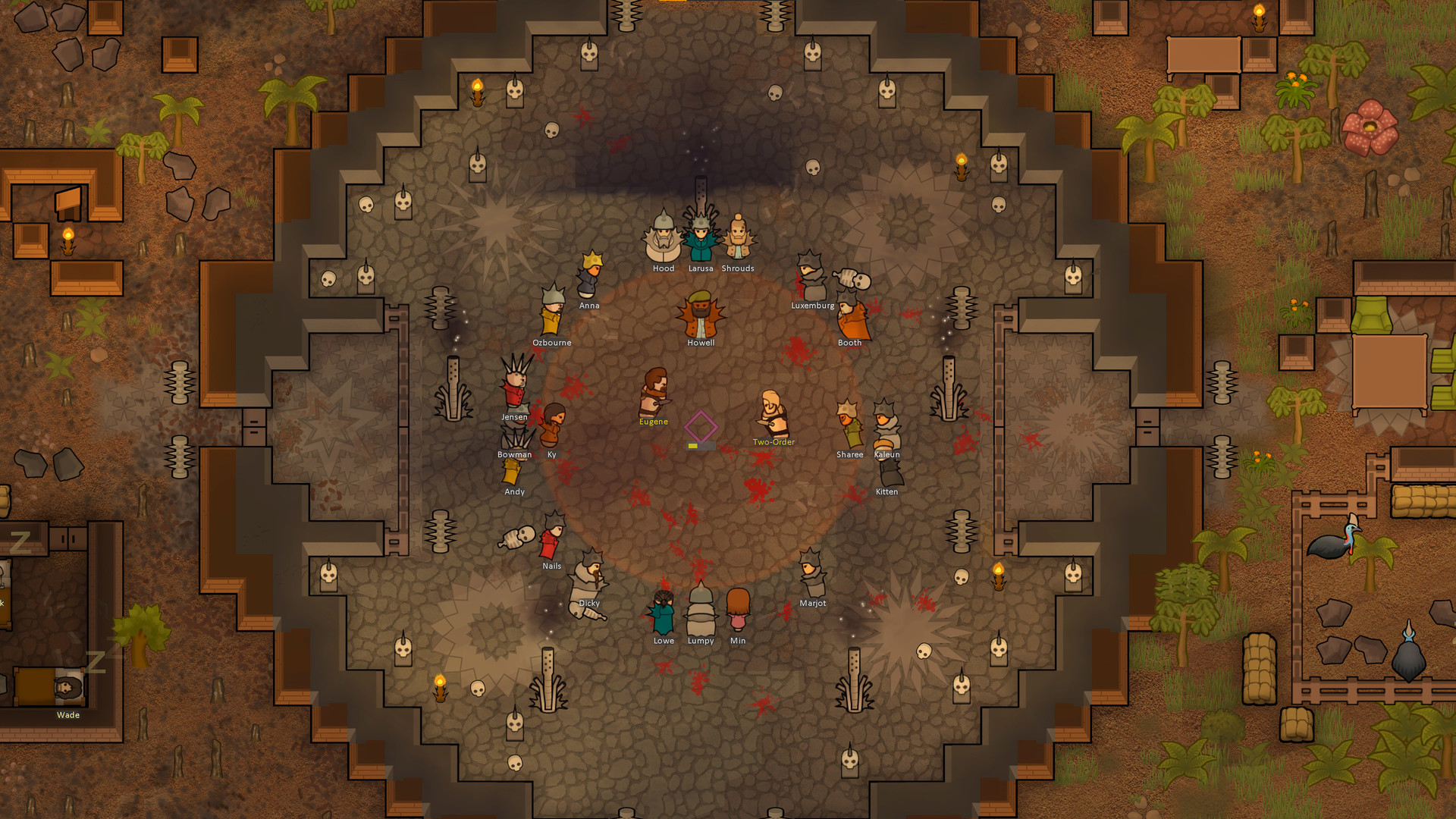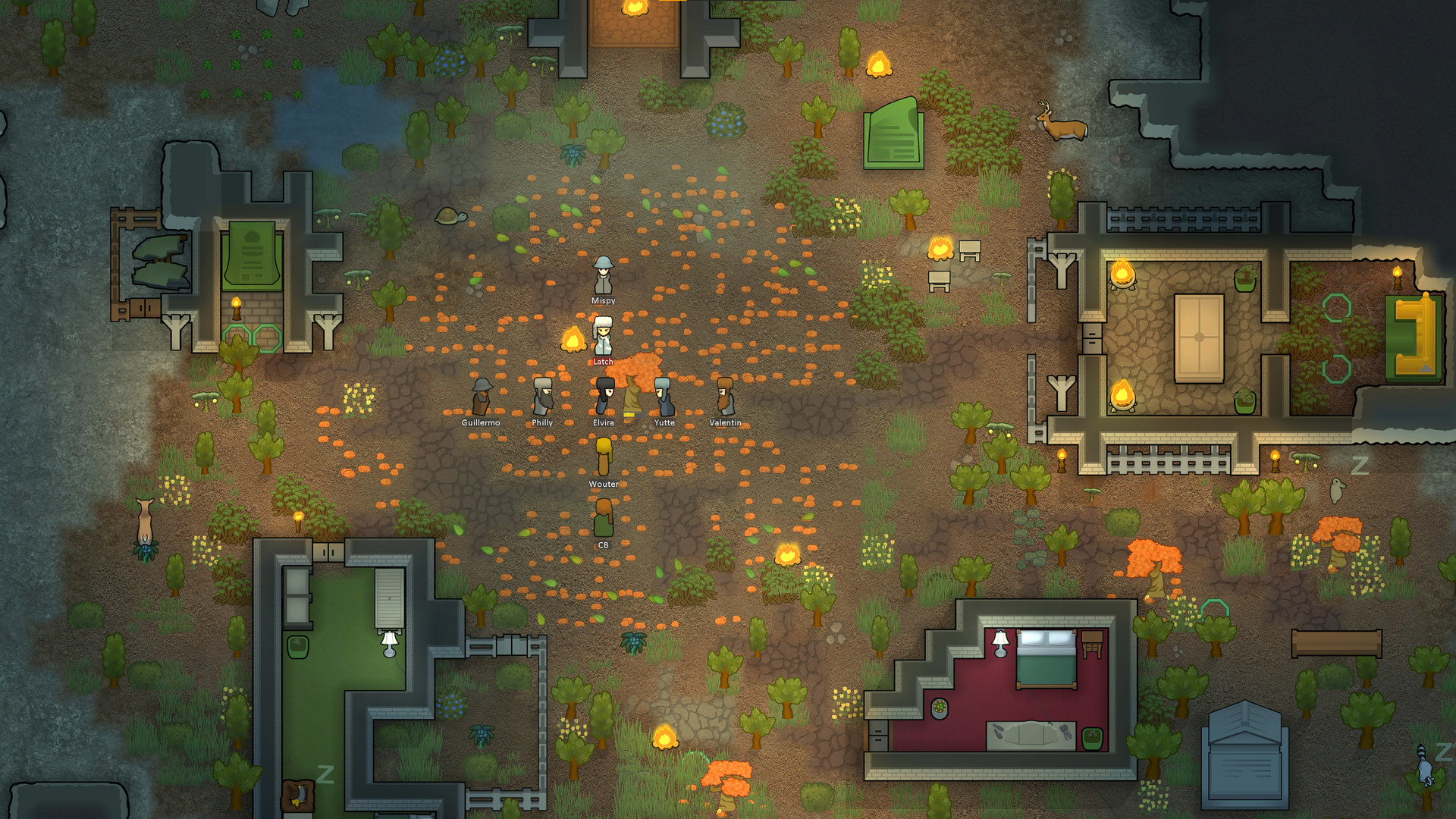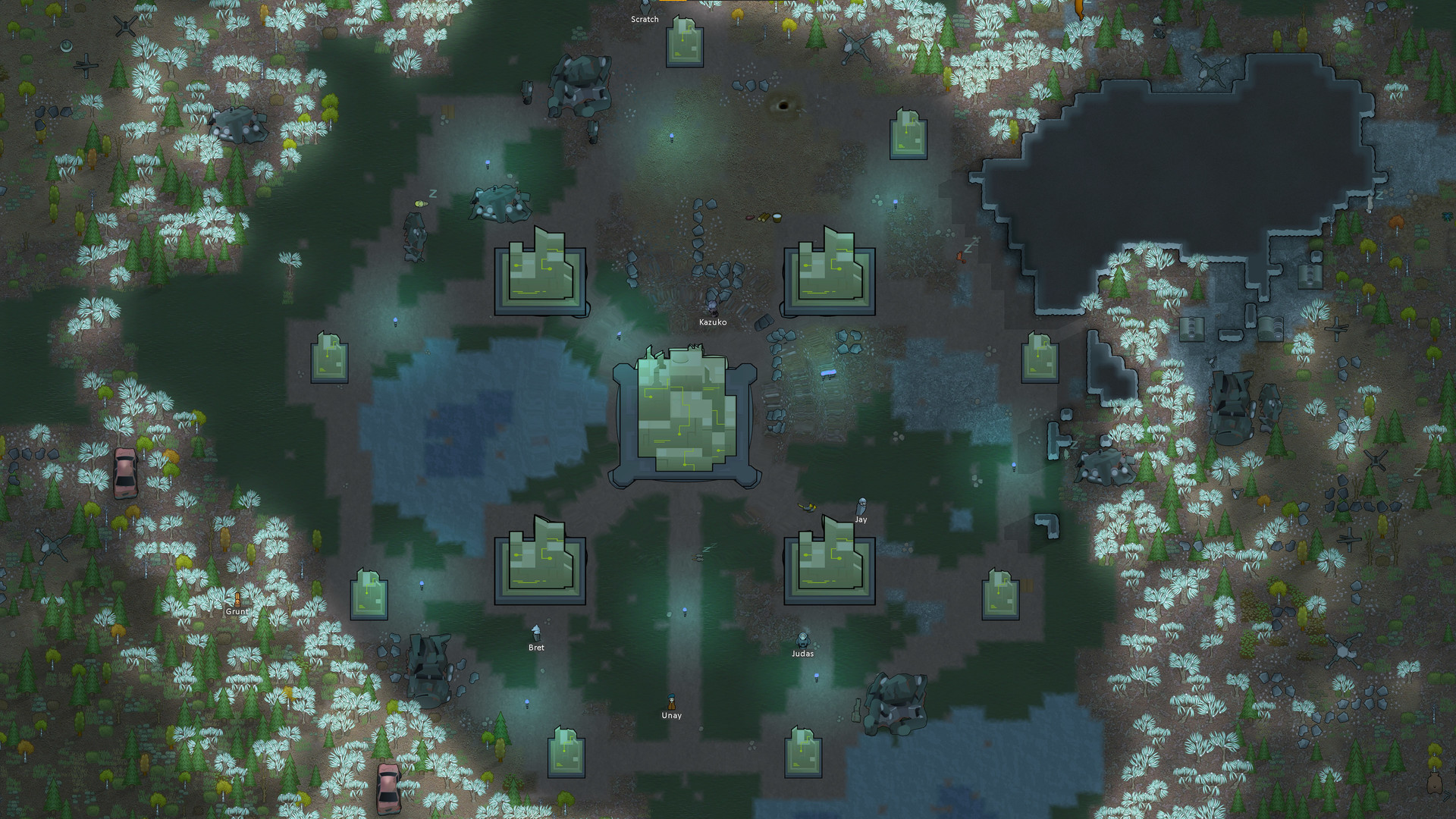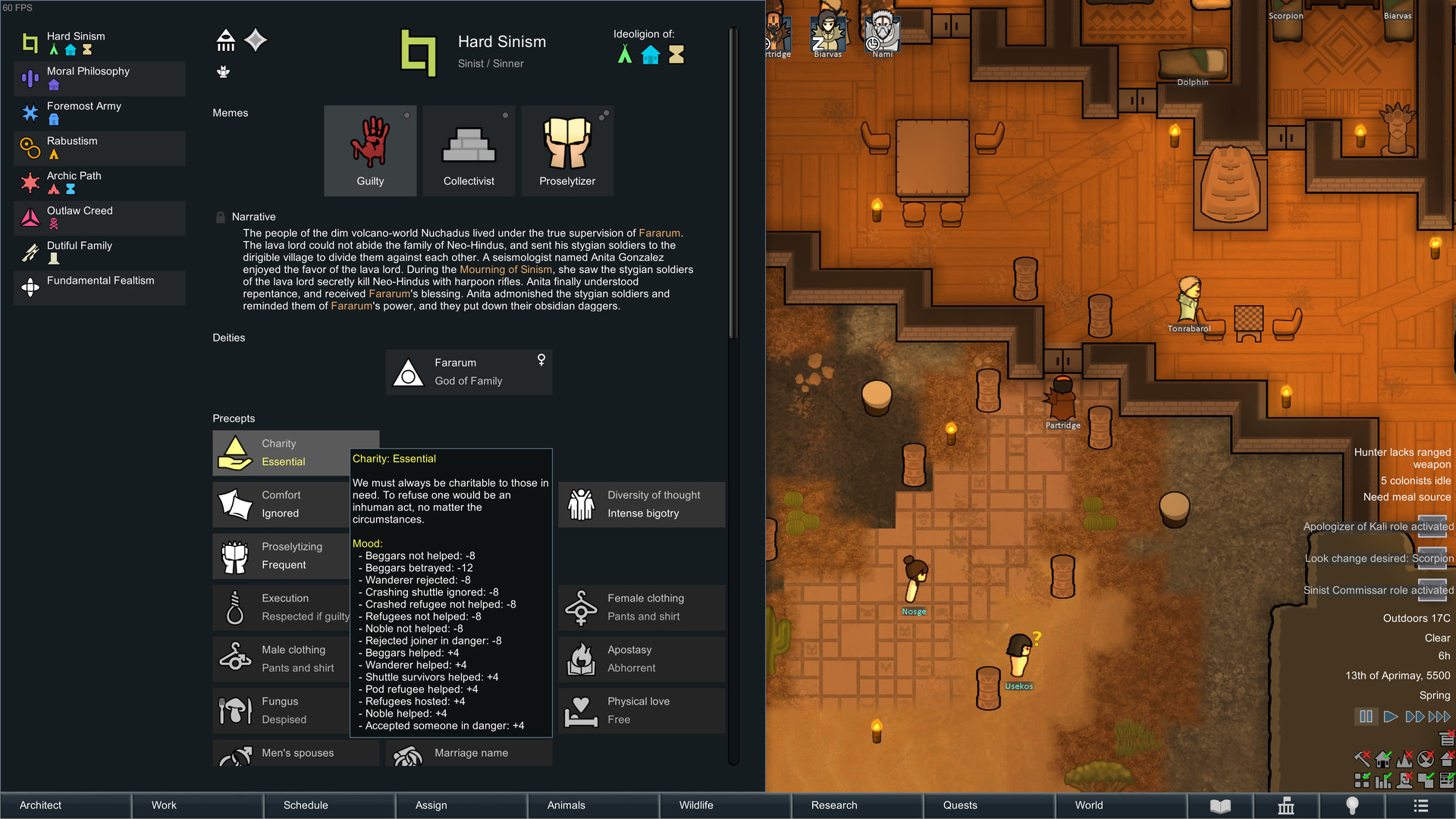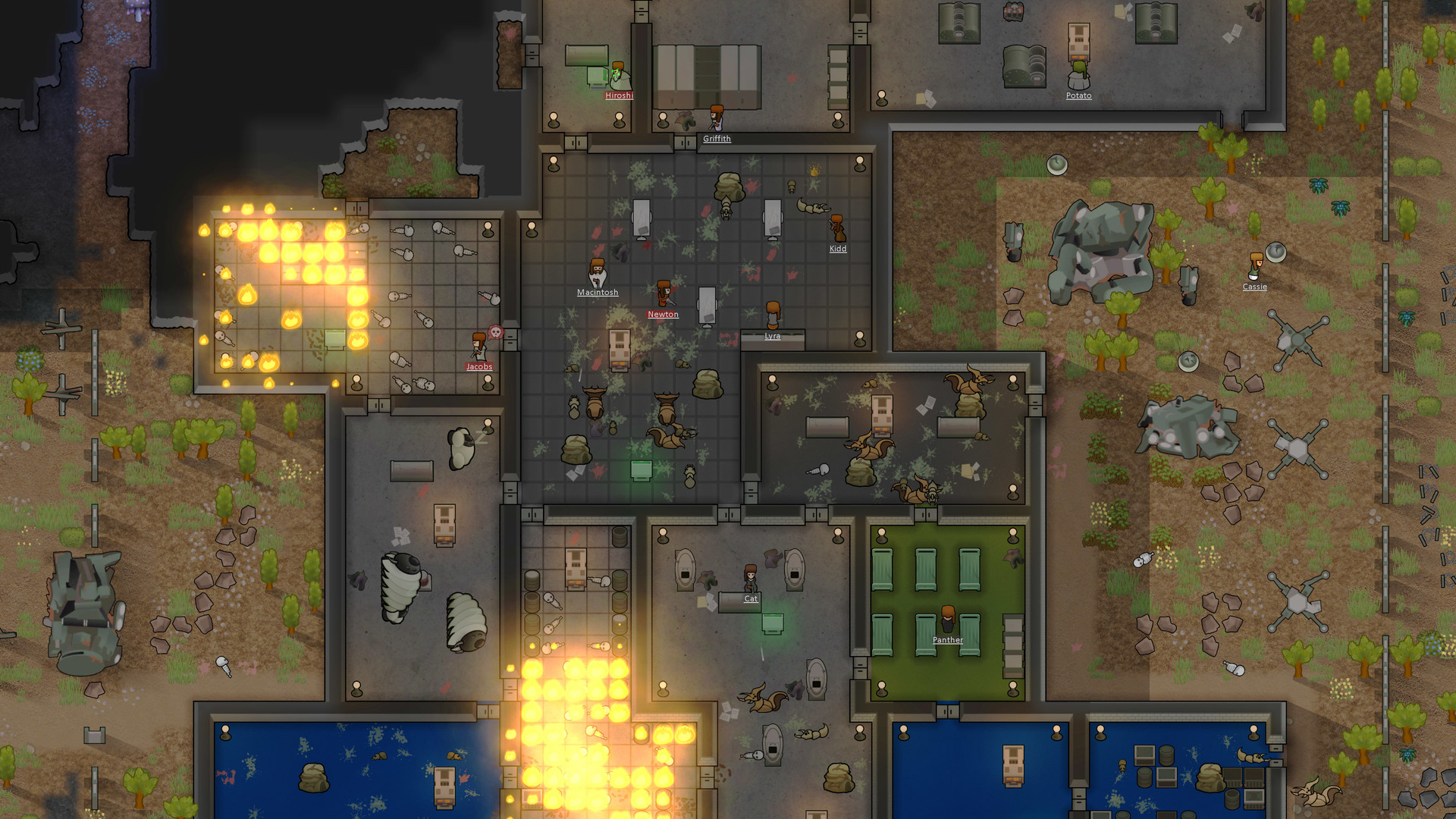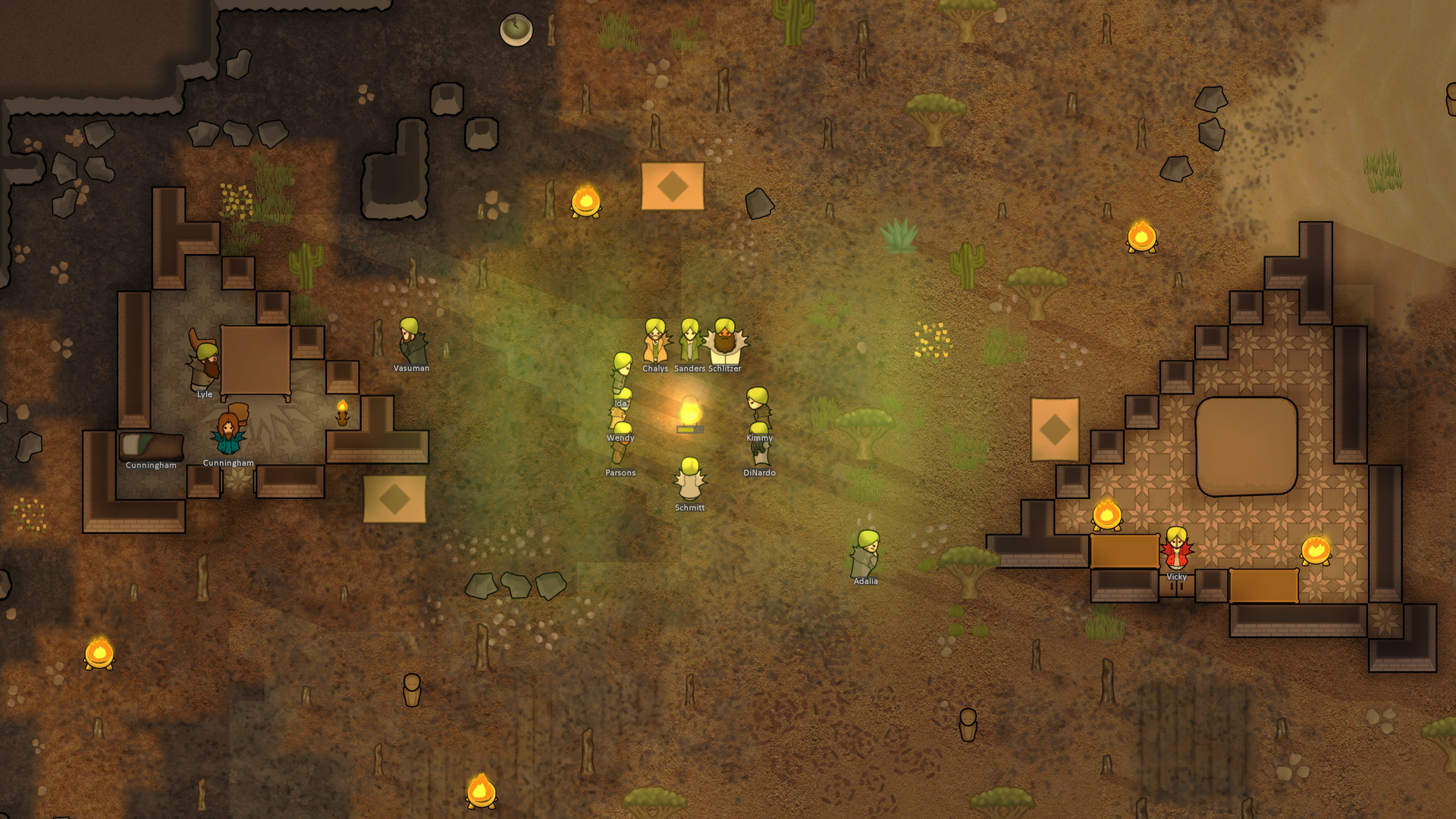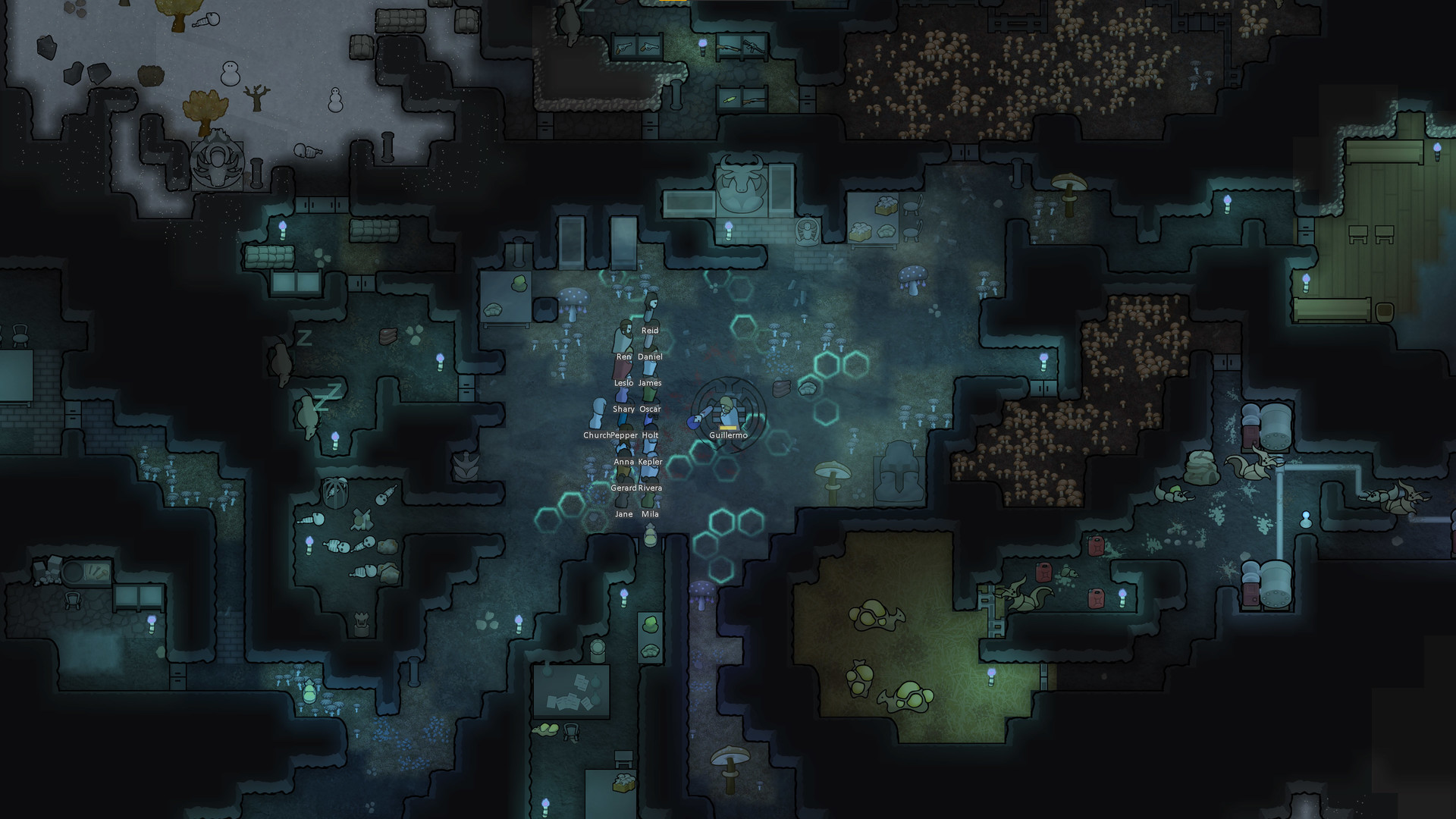RimWorld - Ideology

With the Ideology expansion, each person in the game gets a belief system.
Belief systems define social roles for leaders, moral guides, and skill specialists. They invoke rituals from gentle festivals to brutal sacrifices. They guide preferences around food, comfort, love, technology, and violence. They venerate specific animals, desire different apparel and tattoos, and give access to different buildings and strategies.
Everything is customizable. Make your own story of pirate nudist cannibals, blind undergrounder mole people, charitable ranching cowboys, machine-obsessed transhumanists, or rustic peaceful tribes who link with curious tree creatures.
You can build mind-bending temples with colorful drug motifs, terrifying sacrificial altars clad in skulls, winding mazes of underground tunnels full of technology, or beautiful orchards with drifting leaves.
You’ll hold unforgettable rituals - sick dance parties with pounding music, bountiful feasts of human flesh, beautiful skylantern festivals, ceremonial blindings, Christmas festivities around the tree, vicious gladiator duels, and more.
As you grow powerful, you’ll hunt for the venerated relics of your belief system in new multi-part quests. Penetrate ancient complexes full of diverse threats. Infiltrate wary tribal villages and hack downed spacedrones while holding off other treasure-hunters. Find the relic in its ancient temple and bring it back to your reliquary to attract wealthy pilgrims to your colony and help you convert even more people to your beliefs.
And when you’re successful and secure, you can seek transcendence beyond reality in the new, epic archonexus endgame.
Ideology makes your story into your story more than ever before.

Each belief system is built around a collection of 1-4 core memes, where each meme represents a core idea in the belief system. By combining memes and changing the details of how they are expressed, you can create a near-infinite variety of different belief systems.
The memes are:
- Animal personhood: Animals have rights as humans do.
- Rancher: Raising animals is the right way; raising plants to eat is not.
- Pain is virtue: Virtue is shown through the suffering of self and others.
- Darkness: Bright light burns and destroys! Darkness nourishes and creates. People ought to live in darkness.
- Tunneler: Humans ought to live underground, and enjoy the succulent fruit of the depths.
- Tree connection: Trees are the essence of life, and we must be near them.
- Nudism: Clothing binds, controls, and suffocates us. We should all hang free.
- Blindsight: Only the blind can perceive true reality.
- Cannibal: We must consume human flesh.
- Transhumanist: Human progress means merging with technology.
- Flesh purity: The human body should not be debased.
- Raider: The strong should take from the weak.
- Proselytizer: It is our duty to spread our beliefs.
- High life: Exotic states of mind are central to a good life.
- Nature primacy: Man is a stain on nature's perfection.
- Human primacy: Humans are the moral center of the universe.
- Female supremacy: Women are the superior gender and should rule.
- Male supremacy: Men are the superior gender and should rule.
- Supremacist: Our people should dominate all others.
- Loyalist: We stand for our own before others.
- Guilty: Our people carry guilt from ages past. Others are more worthy.
- Individualist: A community's role is to serve each individual.
- Collectivist: A person's role is to serve the community.

Each meme can give rise to a variety of different precepts. Each precept is a specific rule or guideline which affects a specific behavior or preference. The same meme won’t always imply the same precepts - if you want fine control, you can edit and randomize precepts exactly the way you like. Some precepts relate to issues like:
- Eating nutrient paste: This meal can be seen as disgusting or efficient.
- Cannibalism: Some believers find eating human flesh abhorrent, others are unbothered, and some hunger for it.
- Insect meat: The slimy flesh of insects can be gross or delectable.
- Fungus eating: Mushy fungus food, which can now be farmed underground on fungal gravel, is preferred by some and hated by others.
- Organ use: Opinions differ on the harvest, sale, purchase, and installation of organs.
- Execution: This act is potentially evil beyond measure, necessary, and even enjoyed.
- Venerated animal: A certain animal is believed to have a special moral role. Therefore, it must never be harmed, and people are happier with it around.
- Animal connection: Some belief systems have a strong connection to animals and consider them friends.
- Slaughtering animals: It may be necessary for food, but others strongly disapprove.
- Apostasy: Abandoning one’s belief system indicates character flaws or deep immorality.
- Autonomous weapons: Views vary on whether machines should be allowed to decide who to kill.
- Blindness: Some people believe that to be blinded is to be moral and unclouded by physical reality. Others disagree.
- Blind psysense: Blind individuals have special ways to connect to the psychic aether.
- Body modification: Some demand modified bodies, while others abhor them.
- Bonding: Some believe forming personal bonds with animals is good - others don’t.
- Charity: Charitable belief systems emphasize the importance of generosity and helping others.
- Men/women’s spouses: Rules exist regarding how many spouses a man or woman can have.
- Physical love: Restrictions on intimate life.
- Comfort: Some pay no attention to comfort.
- Slab bed: Some think the proper way to sleep is on a cold, uncomfortable slab.
- Corpses: Seeing the dead may be disturbing to colonists or it may not bother them at all.
- Drug use: Drugs may be prohibited, limited to medical and social use, or essential.
- Diversity of thought: Varies widely from deep appreciation to intense bigotry.
- Killing innocent animals: Such acts may be disapproved, hated, or unthinkable.
- Lighting: Those adjusted to the darkness have a preference for darklights.
- Darkness combat: Some believers fight better in the dark.
- Meat-eating: Colonies might be strict about following a carnivore diet, or reject it completely.
- Mining: Raiding the earth of its resources is an ugly act.
- Male/female clothing: Opinions differ on which parts of the body should be covered.
- Pain: To suffer and undergo violent, nerve-singing pain is to be moral.
- Proselytizing: Spreading your beliefs may be an occasional task or your ultimate duty.
- Raiding: The strong take from the weak. Failing to do so means that you are also weak.
- Ranching: The right way to live is to raise large animals for their meat. Crops have no place here.
- Research: Expanding one’s knowledge may be trivial or crucial to a colony.
- Scarification: Some belief systems value ritual scars on the body, while others deplore the idea.
- Skullspike: Not all enjoy collecting skulls and sticking them on pikes. But some do.
- Slavery: Belief systems have different views on the ownership and trade of slaves.
- Small spaces: Some people have no issue with claustrophobic spaces.
- Sleep accelerator: To sleep without an accelerator would be foolish and a waste of time.
- Biosculpting: Biosculpting is demanded by some believers, whereas others feel it violates the body.
- Age reversal: Why would you ever get old if you had the power to reverse it?
- Neural supercharger: Some think it’s degrading to live without having their brain constantly supercharged by technology.
- Cutting trees: Some may grow upset when trees are cut down, to varying degrees.
- Trees: Believers want to be surrounded by nature and grand forests.
- Gauranlen connection: Some belief systems have a much stronger connection to the Gauranlen trees and their dryads.
- Weapons: There are preferences for weapons. Some are noble and sought after, others are despised.
- Work drive: The leader’s work drive ability is tripled.
Belief systems each have an underlying structure. These don’t have gameplay effects, but they give variety to how different belief systems look and feel, and the narratives the game generates for them:
- Ideological beliefs are justified by historical narratives.
- Theistic beliefs may be monotheistic or polytheistic, seeing their gods as abstract or physically-embodied. Some may be distant descendants of historical belief systems.
- Animist beliefs see spirits in the world around us.
- Archist beliefs see the superintelligent machine archotechs as the true gods of reality.

People can convert each other to new beliefs. You can assign wardens to convert prisoners, or use the special abilities of your moral guide.
People will also spontaneously try to convert those around them. Those with proselytizing beliefs will do this much more intensely - which can lead to conflict.
Depending on traits, some people are much easier to convert than others.
You can bring everyone in your colony to one belief system, or try to keep a diversity of beliefs to capture the benefits of all of them.

Make use of your favourite colonists’ strengths and skills by assigning them formal social roles. Each belief system defines special roles that believers can take on.
- The leader role gives inspirational speeches, buffs combat allies around them, encourages harder work, and plays a special role in some rituals. They can also accuse individuals of crimes and hold trials.
- The moral guide role supports the mental well-being and spiritual strength of your people, and leads many rituals including funerals, sacrifices, and more. They can preach health to the sick to speed up healing, provide counsel to sad colonists to lift their moods, reassure people in their beliefs, and convert non-believers to their own belief system.
- The specialist role gives better effectiveness at one primary skill and gains a special ability related to that skill. As a tradeoff, specialists become more focused on their specific skill and won’t do some other work. You can assign many specialists.

Each belief system defines a collection of unique rituals. These player-controlled events are special gatherings that have a variety of impacts depending on how they are carried out. For example, a wild party in a massive dance hall with giant speakers may attract new recruits or lead to the discovery of an ancient complex full of loot. On the other hand, if you throw a party in a field with no music at all, you might not get the same benefits.
Belief system-based rituals include:
- Dance party: Participants dance to music from giant speakers, illuminated by a colorful lightball.
- Drum party: Drummers make music as others dance the night away.
- Social festivals: The leader gives a speech and then people gather to drink and socialize.
- Tree celebration: A social festival around a decorated tree.
- Burn circle: A moral leader gives a condemnatory speech, and the people burn a hated symbol like an effigy or flag.
- Smoke circle: People burn a special giant bong or incense shrine and inhale the smoke together.
- Skylantern festival: People build and release beautiful wooden lanterns that float into the sky.
- Gladiator duel: Slaves or prisoners fight in a ring to entertain spectators. You can supply weapons and they will be used. If a fighter dies, the crowd will come away even more excited.
- Sacrifice: A moral leader kills an animal or prisoner before a crowd.
- Cannibal feast: Colonists gather to devour a scrumptious platter of human meat.
- Scarification: The moral guide inducts a new believer by aesthetically scarring them while others watch.
- Blinding: The moral guide inducts a new believer by blinding them while others watch.
- Funeral: People gather around a grave to remember someone they lost, while a moral guide gives a speech.
Some rituals aren’t specific to belief systems:
- Leader speeches: The colony’s leader gives a rousing speech intended to boost morale. If their social skills fail, it might have the opposite effect!
- Trial: The leader accuses someone of heinous crimes. The accuser and accused argue the case in front of witnesses. If convicted, the accused can be punished without social consequences.
- Public execution: A killing of a prisoner. This goes best after a trial where the prisoner is found guilty of something.
- Tree connection: A majestic ceremony where a colonist connects with a Gauranlen tree, giving them the ability to command the dryads inside.

A unique type of tree called the Gauranlen tree will occasionally sprout near your colony. These majestic orange trees have a symbiotic relationship with small creatures called dryads. The tree supports the dryads, and in return the dryads protect the tree. Each tree has a few dryads attached to it.
A colonist can connect with a tree in a special ceremony. By pruning the tree over time, the colonist can strengthen the connection and gain the ability to influence its dryads.
Under your influence, dryads can specialize into different castes:
- Carrier: These chunky helpers will haul things where they need to go.
- Clawer: Vulnerable but fearsome, the clawer specializes in damage dealing.
- Barkskin: Slow but tough, the barkskin soaks hits for your other fighters.
- Woodmaker: Generates wood over time.
- Medicinemaker: Generates herbal medicine over time.
- Berrymaker: Generates berries over time.
- Gaumaker: Produces Gauranlen sprouts to make new Gauranlen trees.
Beliefs matter. If your colonists venerate the trees, they can connect with Gauranlen trees more effectively and influence the dryads more efficiently. Only those who truly respect the trees can control their reproduction. With time, such a tree-connector colony can build an economy and an army from its Gauranlen orchard and the cute, useful, fearsome dryads.

Every belief system holds some special objects as relics. It might be an ancient sword, a skull, a piece of armor, or anything else. Embark on multi-part quests to find and collect the relics that you believe in.
Hunting a relic involves several kinds of quests to find the relic:
- Ancient complex quests take you to long-forgotten ruins containing treasure and info about the relic. A wide variety of challenges may await you - cryptosleeping soldiers, insects, sleeping mechanoids, unstable fuel stores, or pirates who followed you to the site. Use these threats against each other to survive while taking what you want.
- Spacedrone quests begin with an spacedrone landing beside your colony. It contains info on a relic, but you’ll have to hack it first! Build defenses on the spot to protect yourself against other treasure hunters while you extract the info.
- Worshipped terminal quests involve an ancient terminal venerated by a tribal village. They will allow you to visit, but attempting to hack the terminal will cause the locals to attack. Consider launching an attack from outside the village, or enter peacefully and try for a smash-and-grab. It’s your choice.

Ideology also adds some new quests not related to the relics.
Ancient complex loot quests see you raiding loot-filled ancient complexes, either in a shuttle or by traveling in a caravan. These ancient complexes aren’t about finding a relic - just about getting rich. Complexes are procedurally-generated and contain a wide variety of threats. The threats are designed to interact with each other and even be useful - You can intentionally wake sleeping ancient soldiers to help fight pirates who followed you to the complex, or ignite an ancient fuel node to burn out giant insects nesting in the next room. It can get pretty crazy - this is RimWorld, after all.
New temporary encampments will set up near your colony. These small communities are lightly-defended and often not associated with any larger faction, making them good targets if you want to become a raider yourself. Beliefs matter - If your beliefs are aggressive, your colonists may even demand this kind of attack be carried out regularly to satisfy their need for dominance. The encampments vary from farms to logging sites, mines, and hunting lodges, each with different kinds of defenders and loot.
Groups of beggars will arrive and ask for aid. Help them, and they might reward you later. You can also choose to betray them and enslave them, recruit them, sell them, or anything else. Beliefs matter - if your beliefs are charitable, your colonists will be especially happy when you take care of the needy travelers.

Belief systems unlock new buildings.
Many of the buildings are used to support rituals. These include:
- Altar: Traditional platforms used in rituals. These are the center of your ritual hall.
- Ideogram: Arcane symbols on the floor that are used in rituals.
- Lectern: Give your rituals a formal look with this slanted stand. Having one nearby will extend the duration of certain rituals’ positive effects.
- Pew: Simple benches for listeners to sit on during a ritual.
- Kneel pillow: Cushions on which people kneel during rituals.
- Kneel sheet: Carpets where friends can kneel during rituals.
- Drum: Drummers can create music for rituals and parties.
- Light ball: It spins and changes colour! This ball really amps up your dance parties.
- Loudspeaker: Turn it up! Dance parties get more intense the more of these you add.
- Christmas tree: Its pretty lights and ornaments are essential for some merry festivals.
- Pyre: Create a tower of flame by igniting this log structure.
- Sacrificial flag: Think of your enemies and what you’ll do to them in this symbolic burning.
- Effigy: Set human-shaped sculptures on fire and watch them burn.
- Cannibal platter: Feed many hungry mouths with a gruesome feast of human flesh.
- Burnbong: Ignite for a cloud of smokeleaf that fills the room.
- Incense shrine: Light these incense containers for pleasant smoke to be released.
Belief systems also unlock specific new buildables that have specific functions:
- Autobongs: Passively produce a cloud of smokeleaf for everyone around. Associated with drug worship.
- Dark lamps and dark torches: For those who shun the light, these provide gentle illumination.
- Slab beds: For those colonists whose beliefs eschew physical comfort, sleeping on these is noble.
- Sleep accelerators: Accelerate sleep at the cost of power and hunger. Transhumanists want these.
- Biosculpter pods: Reverse aging and heal scars. Essential for those who reject the weakness of flesh.
- Neural superchargers: Supercharge consciousness to speed up work. Transhumanists want these.
- Gibbet cages: Display the corpse of a defeated foe to strike fear into all who see. Aggressors desire these.
- Bonsai plant pots: Tree-worshippers can get their fix of trees even while indoors.

Each belief system is associated with different aesthetic styles. Styles affect how many things look - rituals, furniture, floors, apparel, and art. Your colonists will enjoy being around things that match the styles of their belief system, and some may reject styles of other beliefs.
Styles include:
- Rustic: The homey country ranch look.
- Totemic: A tribal-inspired look.
- Spikecore: The spiky space pirate look.
- Morbid: Skull-and-death imagery for those dark cults.
- Techist: Technological motifs everywhere - circuits and hexes.
- Animalist: Animal motifs.
- Hindu: Descendant of ancient Hindu imagery.
- Christian: Descendant of ancient Christian imagery.
- Islamic: Descendant of ancient Islamic imagery.
- Buddhist: Descendant of ancient Buddhist imagery.
One belief system can mix-and-match several of these together. Make the morbid pirates or techno-Buddhists you dream of.
Styles affect apparel in many ways. Animalist believers may shape their recon armor helmets as terrifying animal faces. Morbid death-worshippers will use skull helmets. Spikecore pirates will wear dusters with spiked shoulders. There are many, many visual variations, so every colony will dress different.
Styles also affect the artwork your colony produces. Statues will display the iconography of their creators’ belief systems.
Some styles also come with specific floors including:
- Morbid tiles and carpets with horror skulls.
- Spikecore tiles and plates.
- Totemic tile and boards.
- Hex carpets and tiles for a techist look.
- Mindbend carpets for those seeking spirits in the smoke.
Styles are also expressed in new decorative floor coverings:
- Spikecore floor stars for your gladiator arena.
- Rustic rugs for that farmhouse look.
- Morbid, totemic, and animalist slabs for those central points in the colony.

Beyond styles, belief systems can make people want to wear specific items of apparel. Some of these can be specific to certain social roles as well - a priest or moral leader may need to wear a special hat or robe.
Ideology includes a variety of new apparel items believers might want:
- Authority caps: Enhance the ability to suppress slaves.
- Tailcaps: For the outdoorsy look.
- Burkas: Full body cover.
- Flophats: Relaxed headwear.
- Slicecaps: High-tech headwear.
- Shadecones: Look good in the sun.
- Visage masks: Cover the face entirely.
- Torture crowns: Add pain, for those who want to suffer.
- Robes: For the solemn look.
- Headwraps and broadwraps: Traditional head coverings.
Colonists also want new tattoos and beards and hairstyles related to their beliefs. They can visit a styling station to recolor garments using dyes harvested from the new tinctoria crop, change tattoos, or restyle their beard and hair.

You can enslave prisoners or purchase slaves from traders. Slaves will work on most tasks like colonists, at the cost of reduced work speed.
Every belief system has an attitude towards slavery - some find the practice abhorrent, while others accept and even demand slaves as part of their beliefs.
You can arm your slaves and command them directly in combat. But watch out - slaves will rebel if they get the opportunity or they are not sufficiently suppressed. Your wardens can suppress slaves by periodically threatening them. You can use structures like terror statues and gibbet cages to passively suppress slaves. You can also make slaves wear special collars and body straps to keep them under control.

As your colony grows wealthy, you’ll have the opportunity to sell the whole thing and start anew with your favorite colonists and animals. In return, you’ll receive a piece of a map that leads to the archonexus - a conduit through which an ancient machine superintelligence is said to affect the physical world.
This quest acts like a partial game reset where you will start over with your selected colonists and animals. You can keep your favorite characters while moving to a new colony in a new place and progressing on an epic quest.
Each new colony appears next to an ancient archotech structure of increasing psychic influence. Study each structure to unlock further pieces of the map. Unlock three pieces, and you can locate the archonexus itself, invoke its power, and transcend physical reality through the mind of the machine god.
Enjoy the endgame credits to a new epic song by Alistair Lindsay.
(All non-English translations are made by fans.)
